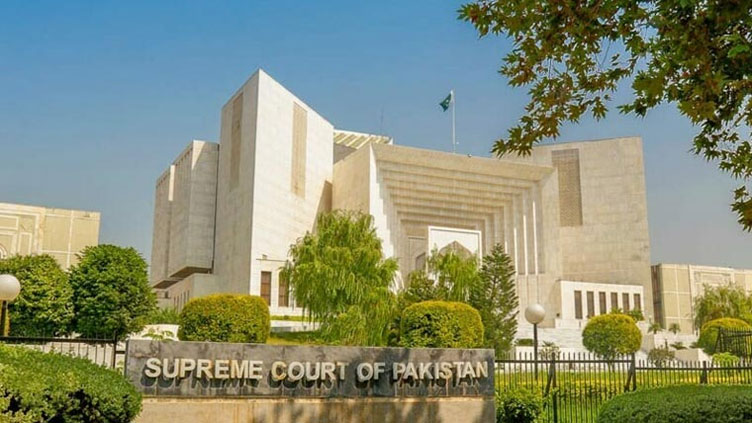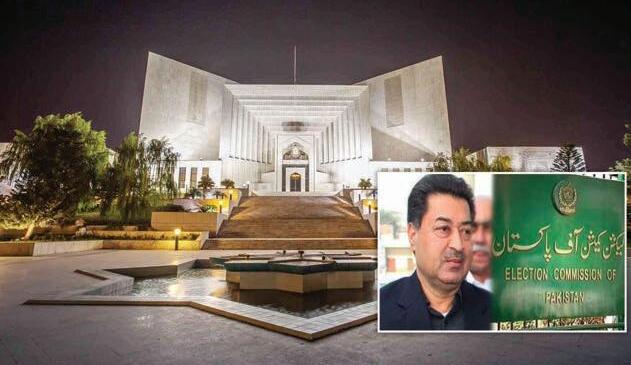
Isn’t it responsibility of judiciary to correct ECP’s unconstitutional step, asks Justice Minallah
A 13-member full court, led by Chief Justice of Pakistan Qazi Faez Isa, conducted proceedings.
Justice Minallah gave the remark when hearing of the petition of the Sunni Ittehad Council (SIC) challenging the denial of reserved seats in the national and provincial assemblies resumed.
A 13-member full court, led by Chief Justice of Pakistan Qazi Faez Isa, conducted proceedings.
Other judges on the bench were Justice Syed Mansoor Ali Shah, Justice Muneeb Akhtar, Justice Yahya Afridi, Justice Aminuddin Khan, Justice Jamal Khan Mandokhail, Justice Muhammad Ali Mazhar, Justice Ayesha A. Malik, Justice Athar Minallah, Justice Syed Hassan Azhar Rizvi, Justice Shahid Waheed, Justice Irfan Saadat Khan and Justice Naeem Akhtar Afghan.
When Attorney General Mansoor Usman Awan started his arguments, Justice Minallah asked him that he did not answer the basic question; the Election Commission (ECP) committed a serious violation of the Constitution by keeping a political party away from the elections, isn’t it responsibility of judiciary to correct it.
The attorney general argued that according to the Constitution, [reserved] seats would go to political parties and not to independent candidates. Political parties became eligible for reserved seats if they won at least one seat, he continued.
He presented record of reserved seat in 2002 and 2018 general elections.
He said that in the 2002 elections, 20 percent seats were won by independent candidates in Balochistan. Independent candidates were not counted while the reserved seats were being determined. However, an independent candidate who joined a political party was considered a member of that party.
At this point, Justice Minallah intervened and the attorney general said that he would answer the question at the end of his arguments.
He said the question is, under Article 51, can independent candidates be included in the Sunni Ittehad Council (SIC)? Is the SIC eligible for reserved seats or not?
Justice Ayesha Malik said in 2024 general election, a large number of independent candidates have been elected.
Justice Mansoor Ali Shah said that the case of independents never came in the court in the past. The number of independents is very high and the case has also been filed in the court, he added.
The attorney general said that according to the constitution, elections are not required to fill a vacant seat if the term of the assembly is less than 120 days.
Justice Muneeb Akhtar observed that political parties are the base of the parliamentary system. The question is, how such a large number of independent candidates returned to assembly? Did the people themselves elect the independent candidates? Did the Election Commission declare them independent? If there’s a mistake, shouldn’t the court correct this mistake? Shouldn’t a legal option be adopted that would remedy this mistake?
Justice Jamal Mandokhel remarked that Article 51 mentions seats, not membership.
Justice Akhtar said that Article 224 is an exception, otherwise no assembly seat can be left vacant.
Justice Akhtar remarked that it is stated that the ECP is a constitutional body. Now its record shows that these people [independents] are the members of the SIC. How the ECP can deprive them of their seats after acknowledging them as a parliamentary party. The ECP informed the parliament that it [SIC} is a parliamentary party. The records are kept for a reason, the justice added.
Justice Ayesha Malik inquired the attorney general is it possible that a political party is not a parliamentary party; if it wins a seat, can it be considered a parliamentary party?
The attorney general said that the elections will determine a parliamentary party. If there are independent candidates, they can join the parliamentary party.
Justice Ayesha Malik said that she was not asking about the independent candidate.
She said she wanted to know about the right to participate in the elections. According to you, the political party will become a parliamentary party; the question is whether the independent candidates are a political party or not.
She said if the ECP does not consider the SIC as a political party, how can it become a parliamentary party?
Justice Shah remarked that people knew that the candidates declared independent belonged to the PTI. The court can dispense justice after taking into consideration all the aspects of a situation.
Justice Minallah said that it has been proved that the ECP misinterpreted the court decision. Should the court endorse this unconstitutional interpretation on behalf of the constitutional institution? Do you want us to revive the DOCTRINE OF NECESSITY?
Chief Justice Isa remarked that the court decides matter according to the constitution and the law. All judgments taken under the doctrine of necessity fulfilled the requirement of justice. In the absence of concrete evidence, the decision were taken on one’s discretion.
The CJP said he is not doubting any judge’s sincerity.
Justice Minallah remarked that should the court endorse the serious violation of the constitution. A constitutional body interpreted something unconstitutionally; should the Supreme Court endorse it?
Chief Justice Qazi Faez Isa remarked that no party has said that the seats should remain vacant. Every party argued that the seats are theirs. If it is so, why are you taking so much time? Why didn’t the makers of the constitution ponder such a situation can arise? This was their job, not ours. Address the constitutional question which is before the court, he added.
The attorney general said that Advocate Faisal Siddiqui had said that the seat should be left vacant if not given to the SIC.
He said for a parliamentary party, it is necessary for the political party to have won a seat in the elections. A parliamentary party comes into being after the members are sworn in. The question of a parliamentary party is irrelevant here as the matter is related to pre-election situation.
Justice Mansoor Ali Shah asked him where the constitution does not mention the formation of a parliamentary. The attorney general replied that the parliamentary party is mentioned only in Article 63A. It is imperative for under the article that the parliamentary party exists.
The attorney general expressed his ignorance when Justice Shah asked him whether the ECP has declared the SIC as a parliamentary party.
Justice Shah asked the attorney general under which authority the ECP declares a parliamentary party? How the notification of declaring a parliamentary party is issued? Whether that notification has been placed on record by the SIC?
The attorney general said that the [SIC] party will explain it in its arguments. But Justice Shah insisted on him to answer the question he raised.
Seeing him perplexed, Justice Shah showed the notification to the attorney general. And the counsel for the SIC also showed the notification issued by the National Assembly Secretariat.
Advocate Siddiqui said that the National Assembly has also named Zartaj Gul as the parliamentary leader of the party.
It may be remembered that CJP Isa remarked on Monday that if the ECP has done something unconstitutional, the court would annul it.
Later, the court adjourned the hearing till July 9.

